
For businesses, choosing custom suits online opens a world of options tailored to their clients’ needs. Choosing the right fabric is very important so that every suit looks great, feels great, lasts long, and goes with the occasion it is being prepared for. It is for this reason that we have elaborated on each aspect of selecting the fabric, which will walk you through the process by making your business take a prudent decision when ordering suits online.
Apart from the aesthetic point of view, the choice of fabric in bespoke suits is very important, as comfort and durability depend on it; many other factors might be determinants in regard to the occasion. High-quality fabrics mean that the suit will keep its shape over time and it will look polished and professional. Fabrics like wool, linen, cotton, and blends differ in benefits: wrinkle-resistant, breathable, and so on. The business customer must be educated that choosing the right fabric helps project the desired image; it also means the comfort of the end wearer. A suitable fabric brings a suit to life, reflecting quality and sophistication representative of the business itself.
When it comes to custom suits, several main fabric types are worth considering, each offering unique benefits.
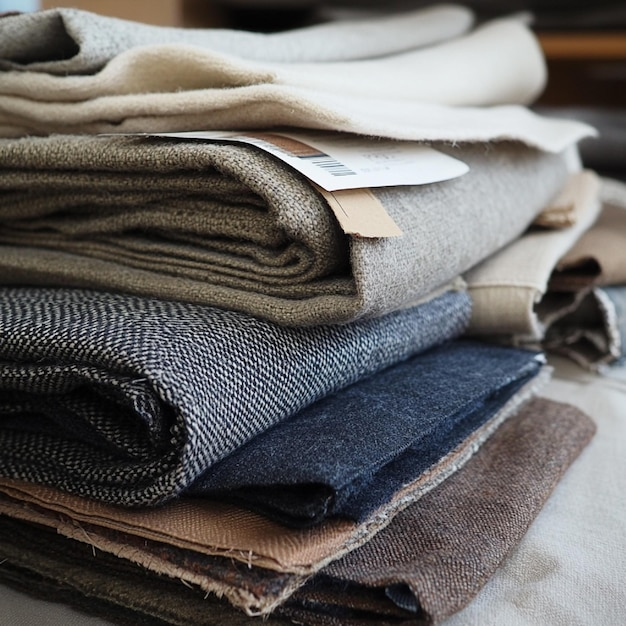
Of all fabrics, wool is one of the more popular and versatile choices for bespoke suits. It is durable, breathable, and has a natural stretch to it that enhances comfort. It is highly resistant to wrinkles and generally holds an excellent shape-a reason it is well used in custom formal wear. It is available in various weights, which enables a business to choose wool suits for wear throughout the year or during certain seasons.
Cotton is a very breathable and comfortable fabric, besides being less formal than wool. For this reason, cotton suits are perfect to wear during the months of summer and are just ideal for business casual wear. Though not as resistant to wrinkles as wool, cotton looks clean and polished whenever it is well tailored. Cotton can be good for businesses serving clients who like a less formal yet refined manner of style.
Linen suits are light and airy, hence very well suited for hot climates or summer events. Linen suits offer great airflow and truly feel easy to wear in warm weather; however, linen has a tendency to wrinkle easier than other fabrics. This can add a casual, relaxed charm but businesses may want to keep this characteristic in mind as not all clients desire such an appearance. Linen works for casual settings, outdoor events, and business-casual environments.
Silk and velvet are high-end options that give a truly sophisticated and different feel to a bespoke suit. A silk suit is light and airy, with a natural luster, while the fabric makes it ideal for formal occasions and evening wear. On the other hand, velvet is heavier; it gives a rich texture, best suited for cooler climates and special occasions. Companies offering a high-end, bespoke service may find silk and velvet attractive materials for clientele that want an exclusive, sumptuous look.
Fabric weight is a significant factor in custom suits, affecting comfort, appearance, and seasonality.
Fabric weights can also be changed to fit the seasonal needs of the customer. For instance, lightweight fabrics such as linen and cotton would be best for spring-summer, while heavy wool and velvet are fitted for autumn-winter. The apt weight ensures comfort for the wearer while retaining its shape.
The weight of the fabric can determine a fabric's drape and how it hangs on the body. Generally speaking, heavier fabrics are more structured and formal, while lighter fabrics hang more loosely and are easier to wear and move around in; thus, they are better suited for more casual occasions. For instance, wool and velvet both drape very well and give a sense of refinement, which is appropriate for formal business attire, while cotton and linen offer lighter drapes, suitable for business casual.
Depending on the intended impression, great consideration will need to be taken with the pattern and texture, as these are two large factors that will determine what the custom suit is going to look and feel like.
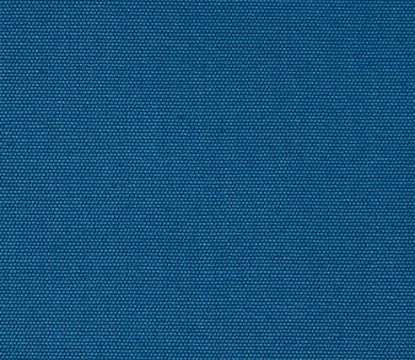
No matter the year or season, solid-colored suits always stay in, blending into any environment-from ultra-formal business meetings to semi-casual gatherings. In contrast to patterns, solid colors keep the outfit neat and smooth, so finding a match for an accessory is not that difficult. A solid black, navy, or gray-colored suit is versatile and serves as a reliable choice for most business environments.
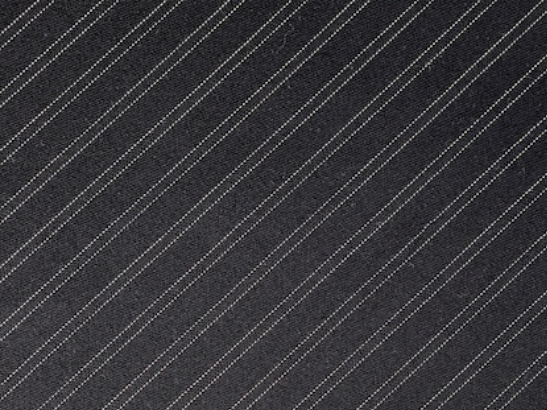
Pinstripes
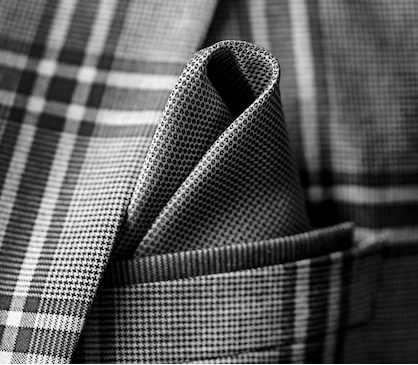
Checks
Pinstripes and checks are the gold standard for adding character to a suit. Pinstripe suits have a very professional, businesslike feel that's appropriate in the most formal settings. Checkered patterns-windowpane and plaid included in this group are a bit more casual yet still professional and could be considered for semi-business or special event type environments.
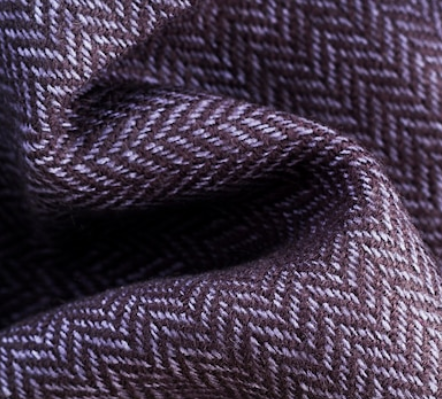
Herringbone
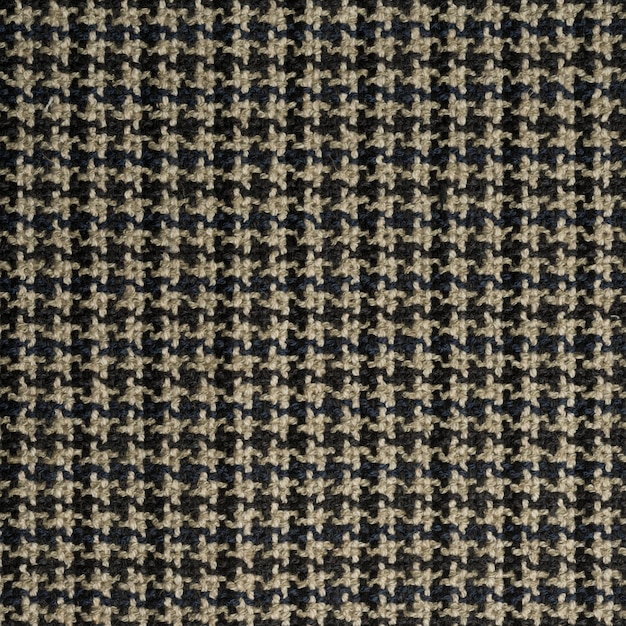
Houndstooth
Such textures as herringbone and houndstooth provide the special visual interest that can be added to custom suits. These patterns are slightly subtle and refined in appearance and, for the most part, geared to fall and winter seasons due to the thickness of the weaves. They are notably in a great deal of wool suits and excellent for that client looking to add a classical yet stylish option to their wardrobe.
The fabric choice can also depend on the occasion, as certain fabrics lend themselves better to specific events.
Wool and silk are good for formal events because they are fairly polished and refined. For less formal events, some latitude may be allowed. Cotton and linen work for business casual or outdoor events because of their comfort and somewhat relaxed look.
Because it is versatile and resists wear, wool remains the first choice for business suits. For weddings or other occasions calling for something more sumptuous, velvet or silk can create a seemingly impressive display of elegance.
Fabrics can vary a great deal in durability and in the amount and type of maintenance necessary. For example, wool is usually easy to care for and very durable and is, therefore, a good choice when one intends to wear the garment frequently. Cotton and linen may require cleaning and pressing oftener to look their best. Velvet and silk are more fragile and require care in handling; they are better bought for occasional wear rather than everyday business wear.
Made-to-measure suits online may seem challenging, but modern tools make the experience both engaging and informative. At Kutetailor, our customization platform offers a range of digital tools to help clients make the best fabric selections.
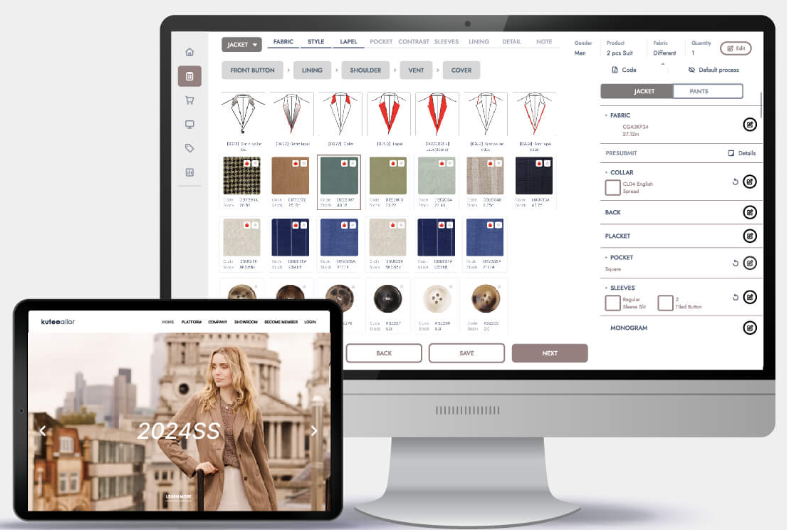
High-resolution images and videos allow clients to zoom into the fabrics in great detail for texture, color, and finish. In this way, business clients may make informed choices even without physically touching or feeling the fabric.
These virtual swatches give one a very realistic feeling in terms of fabric choices, while the 3D visualization tool gives an idea to the client about how that fabric would look on a suit that is finished. Such features help business clients to visualize the final product and make informed decisions with much more confidence.
With our color-matching tools and fabric simulation options, clients can play around with colors and patterns to ensure that the kind of fabric they choose is exactly what they have in mind. We have made choosing fabrics for tailored suits a little easier and more accurate with a variety of color choices and visual aids.
As you make your final decision on your fabrics, consider the following:
First, understand the basic setting and purpose of whether executive wear, client-facing, or event-specific uniforms. Choosing a fabric appropriate for the intended usage will help ensure that the suits will meet both aesthetic and functional expectations.
Comfort will be really important, as some team members may need to wear such suits throughout the day. Choose fabrics that do not hinder movement and reflect the type of professional style your business projects. Versatile choices, such as wool or quality blends, can adapt to a number of settings and seasonal needs, so no suit goes out of place in diverse settings.
The fabric specialists at Kutetailor can assist in the selection of materials that cater to your industry standards and the particular needs of each position. With our comprehensive array of fabrics and deep experience in bespoke tailoring, we can assure you that your bespoke suits will definitely meet quality, comfort, and branding. Please feel free to contact us and see just how much Kutetailor can make a difference in your bespoke suit experience with precision and professionalism.